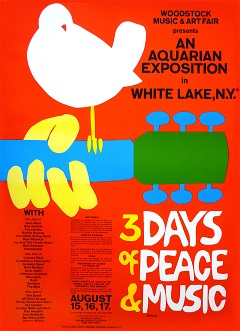The Incredible String Band
The ISB Live At Woodstock 1969
Woodstock marks the high point for many groups; some of which flickered out of existence soon after the festival. The Incredible String Band is one of these faded groups.
Although Woodstock being the high point of many bands career is hardly a prophetic statement, but perhaps it was the festivals unparalleled historical and cultural significance which marked the apex of their career.
The Incredible String Band formed in 1965 in Glasgow, Scotland with members Clive Palmer and Robin Williamson. Originally the band was an acoustic folk duo, but with the addition of rhythm guitarist Mike Herron, they became the Incredible String Band and released a self titled record under the same name.
The band also continued to have success after the departure of Palmer to India and Afghanistan as he followed the Hippie Trail; they released two more albums before their success finally began to taper after their Woodstock performance.
The ISB refused to perform in the rain at Woodstock 1969 and therefore, the slot was filled by Melanie. When the time came for them to perform the next day, the crowd was extremely far from Zen-like. The refusal to play in the rain also resulted in the ISB not being featured in the iconic Woodstock documentary.
It seemed as though despite the nuances that set them apart from those similar to them: colorful and exotic dress, poetry, and sketches, all within the low-fidelity context of the hippy culture, the ISB was losing popularity at an alarming pace. Their next releases after Woodstock were seen as dismal failures in comparison to their early work, and eventually the band, through various human conflicts became a revolving door of musicians until their final break in 2006 after a hiatus from 1974 to 2003.
Through the magic of the Internet, some of the performances given by the Incredible Strings Band at Woodstock have become available for those who are interested, but what most people remember is a band that made some great music, was ahead of the curve at the time, and simply hit a wall.



